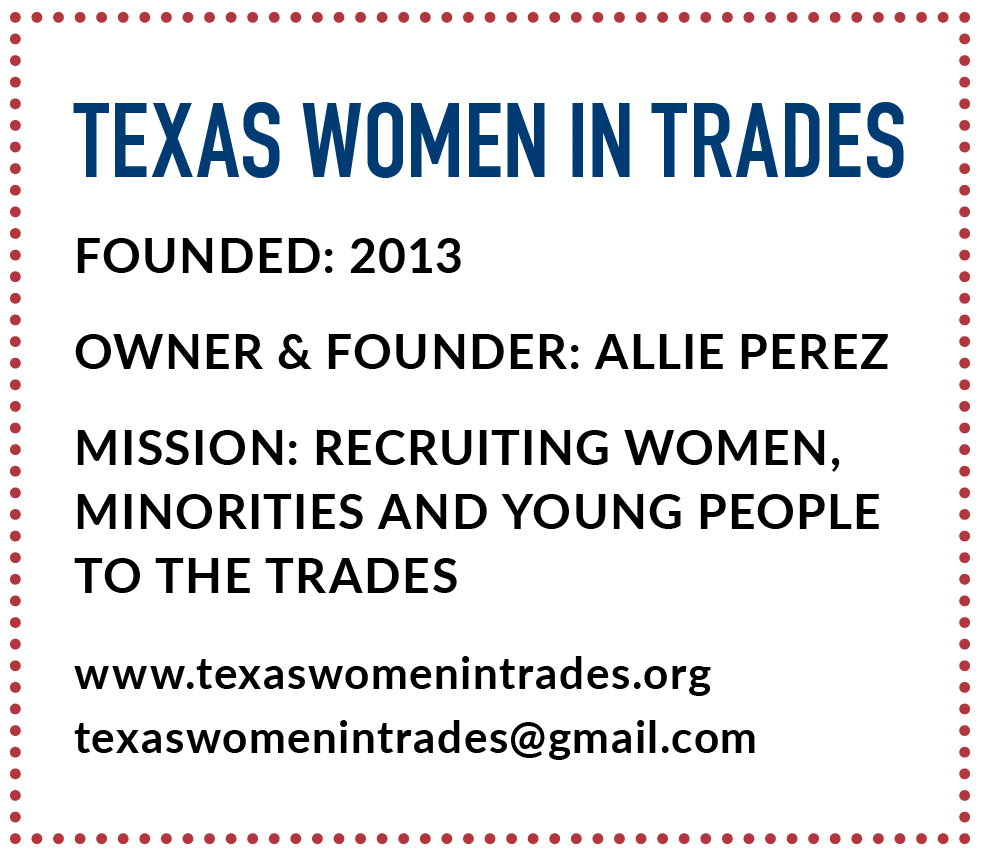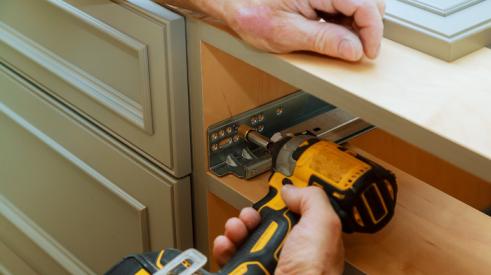While the number of women in the construction trades continues to be dismal year after year, it is steadily increasing:  According to the Institute for Women’s Policy Research, women made up 3.4% of construction tradespeople in 2018—an increase of nearly 18% between 2017 and 2018. When administrative and back office staff working in construction are included, the percentage of women grows to nearly 10%.
According to the Institute for Women’s Policy Research, women made up 3.4% of construction tradespeople in 2018—an increase of nearly 18% between 2017 and 2018. When administrative and back office staff working in construction are included, the percentage of women grows to nearly 10%.
Those figures don’t come close to encompassing the contributions women make, both to their clients and to the industry as a whole. A great example of women bringing their expertise and skills to the table, the community, and the industry? Texas Women in Trades, a San Antonio-based organization striving to bring more women and more young people into the field, through emphasis on camaraderie and community.
An Unconventional Start
When she started working at a plumbing and HVAC company in San Antonio as a project manager, Allie Perez noticed the lack of community surrounding women in these roles in her area, and wanted that to change. “I was often the only woman around,” Perez says, “so I found camaraderie with other women who found the trades to be the industry for them. I wanted other women to experience that, too, and to let the community know that we’re here and we love what we do.”
 Inspired, Perez founded Texas Women in Trades in 2013. From the beginning, it has set out to serve women in all levels of the industry, with the ultimate mission of bringing more females and young people into the trades. Membership is currently free, but all potential members are vetted by Perez, and the group receives support from a handful of businesses and organizations, including BrassCraft Manufacturing, Workforce Solutions, and the Plumbing-Heating-Cooling Contractors (PHCC) of San Antonio and of Texas.
Inspired, Perez founded Texas Women in Trades in 2013. From the beginning, it has set out to serve women in all levels of the industry, with the ultimate mission of bringing more females and young people into the trades. Membership is currently free, but all potential members are vetted by Perez, and the group receives support from a handful of businesses and organizations, including BrassCraft Manufacturing, Workforce Solutions, and the Plumbing-Heating-Cooling Contractors (PHCC) of San Antonio and of Texas.
“When we first started, we were a bridge connector,” Perez says. “We attended a lot of career fairs, hosted events at local organizations and companies that were looking for employees, and spoke at schools that were trying hard to make the connection between their students and professionals already in the industry.”
A decade ago, Perez was on a very different path. “I went to NYU and studied acting, English, and math,” she says. “This is a complete 180 from what I thought I’d be doing with my life, but I love it. Having done both the expected college route and rerouting into the trades, I have an easier time speaking to people about the differences and the benefits of the trades in particular.”
Today, she’s a licensed journeyman plumber, and has completed a PHCC-sponsored plumbing apprentice program.
But Why?
The benefits of joining Texas Women in Trades are plentiful. They include access to workshops, events, and consulting geared particularly toward empowering tradeswomen while educating the greater community on women working in the trades.
“A huge amount of energy and intention goes toward camaraderie,” Perez says. “We’re regularly talking with local organizations and business, the federal Department of Labor (DOL), contractors, and of course the women doing the work.”
Companies contracting with the government in particular often have quotas of gender or ethnic minorities to fill, and Perez sees great opportunity there. “We want to bridge that gap, and help both sides of the equation—get the jobs filled and get these women the work they deserve.” The DOL now recommends Texas Women in Trades as a resource for contractors who are not in accordance with statutes set forth by the federal government that require government contractors to ensure that their businesses provide equal opportunity.
The Texas Women in Trades website has dedicated pages listing female contractors in Texas, scholarships specifically geared toward tradeswomen or young professionals in the trades, and apprenticeship resources,
Giving Back & Looking Forward
This fall, Texas Women and Trades is partnering with the Rape Crisis Center of San Antonio to complete a charity build. “We’re all so excited to bring our skills to the table and directly help the women in our communities,” Perez says.
She and other members continue to hold their full-time jobs in addition to the work they do with Texas Women in Trades, but it’s worth it in their eyes to get the message out there and strengthen the community of tradeswomen. “We loved all the outreach we were doing when this first started, but it became a resource vampire,” she says. “I’d love to be able to hire staff and pivot to doing this full time. Making an impact on not only the state level, but on a national level—that’s the dream.”
She also envisions tradespeople and organizations coming together to help young adults see that going into the trades is just as viable an option as the more widely accepted paths. “Colleges, universities, and the military spend so much time and resources on advertising their benefits to prospective students or recruits,” Perez says. “The trades are disjointed, and we’re not working together to sell ourselves as another great option for this demographic. We need to be shouting the benefits and the earning potential.”
Add new comment
Related Stories
Forty Under 40 Remodeling Trendsetters
The new ideas embraced by our Forty Under 40 winners are examples of forward-thinking leadership in remodeling
How to Create a World-Class Remodeling Team
Great remodeling companies position themselves for the future with the right players
Get the Most Out of Your Teams with This Leadership Style
The transformational leadership style focuses on inspiring and motivating team members to achieve their full potential and exceed their expectations
How to Revamp Your Pre-Construction Process
Experiencing too much slippage and delays? See how Bridget Bacon of Red House Design Build solved these issues by improving the remodeler's pre-construction process
Building A Small Projects Division from the Ground Up
Through hard work and careful strategy, Harth Home Services has seen big growth
A Mindset of Serving Others
A research study shows surprising results about what makes us take ownership of our work.
3 Keys to Successful Team Management
On this episode of Women at WIRC, hear Laura Burnes delve into her approach to leadership and project management, in addition to sharing insights into Adams + Beasley Associates' winning culture.
4 Steps to Prep Your Business for Contraction
How a remodeling company plans ahead for the worst of times (and the best of times)
Helping Remodelers 'Get Their House In Order'
From remodeler to NARI executive to industry consultant, Diane Welhouse uses her expertise to help business owners













